Training Descriptions
The control system in the Heating, Ventilating, and Air- Conditioning (HVAC) system can have a significant impact on the building’s comfort and energy consumption. The control system manages the flow of heat, cooling, and ventilation throughout the building.
This course covers the fundamentals of automatic controls in the HVAC system. Emphasis is placed on the control principles, terminology, basic components, control devices and direct digital control systems. Numerous illustrations and examples have been included to enhance the understanding of the course material.
This course includes a multiple-choice quiz at the end, which is designed to enhance the understanding of the course materials.
Training Syllabus
• FUNDAMENTALs of HVAC CONTROL
o Why Automatic Controls?
o HVAC systems
o How does central air-conditioning system work?
o What Parameters are controlled?
o Control Strategies
o Where are HVAC controls required?
o Benefits of a Control System
• CONTROL BASICS
o What is Control?
o Elements of a Control System
o Theory of Controls
o Type of Control Systems
• SENSORS
o Type of Sensors
o Classification of Sensors
o Temperature Sensors
o Electronic Sensors
o Relative Humidity Sensors
o Pressure Sensors
o Flow Sensors
o Air Flow Measurements
o Dew Point Measurements
o Liquid Level Measurements
• CONTROLLERS
o Controller Action
o Identifying Reverse or Direct Action
o Controller Types
o Reset
• CONTROLLED DEVICES
o Control Valves
o Coil Characteristics
o Valve Characteristics
o Sizing Control Valves
o Dampers
o Damper Applications
o Actuators
o Pumps & Fans Control
• CONTROLLER RESPONSES
o Two-Position Control
o Floating DDC Control
o Proportional Control
o Proportional plus Integral (PI) Control
o Proportional plus Integral plus Derivative (PID) Control
o Stability of the System
• DDC HVAC Systems
o What is DDC?
o DDC Terminology & Theory of Operation
o DDC Hardware
o The Control Network
o Advantages of Using DDC
• ENERGY SAVING FEATURES
o Time Control & Energy Saving Devices
o Optimum Start/Stop Control
o Duty Cycling
o Electric Demand Limiting
o Enthalpy Optimization
o Night Purge Cycle
Training Objectives
At the conclusion of this course, the student should be able to:
• Define the basic blocks of control system;
• Distinguish between open loop and closed loop systems;
• Describe different types of temperature, humidity, pressure and flow sensors;
• Define set point, control point, offset and throttling range;
• Determine controller action for given the application;
• Distinguish between direct and reverse reset;
• Distinguish between the mixing and diverting valves;
• Define flow coefficient, valve authority, controllability, range ability and turndown ratio;
• Describe the sizing of control valves;
• Define proportional control, PI control and PID control;
• Describe direct digital control terminology, hardware and control network; and
• Cite the energy saving benefits of DDC systems.
Participants
• This course is aimed at the personnel who have some limited background in the air conditioning field or who may be having difficulty relating controls to air-conditioning equipment.
• The course is suitable for students, mechanical, electrical, controls and HVAC engineers, architects, building designers, contractors, estimators, energy auditors and facility managers.
 Fundamentals of HVAC Controls
Fundamentals of HVAC Controls QUICK REGISTER :




 How can we help you today?
How can we help you today?